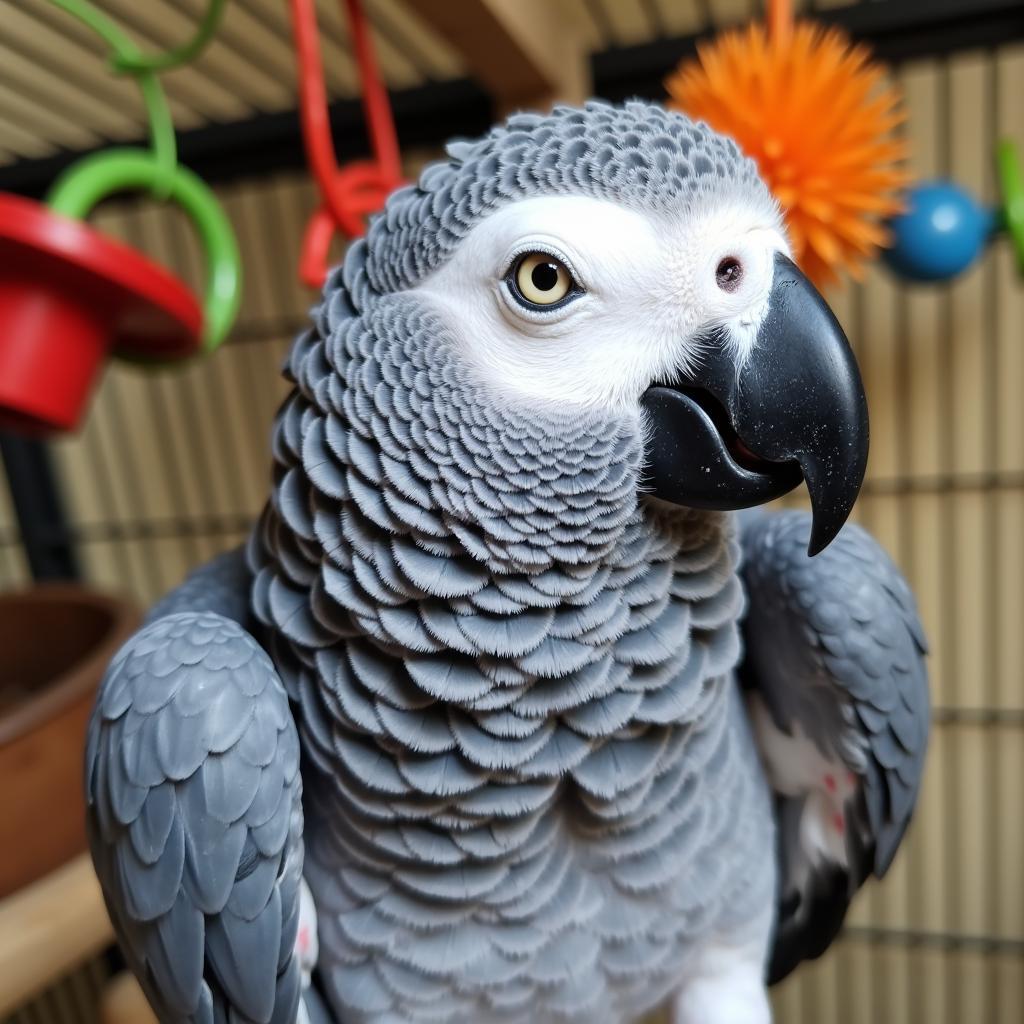Understanding African Grey Behavior
African Grey Behavior is a fascinating and complex subject, reflecting the intelligence and emotional depth of these remarkable birds. Understanding their behaviors is key to building a strong, healthy relationship with your African grey parrot. This article delves into the nuances of African grey parrot behavior, offering insights into their communication, social interactions, and common behavioral patterns.
Understanding your African grey’s body language, vocalizations, and social cues can deepen your bond and ensure a harmonious coexistence. These highly intelligent birds require mental stimulation, social interaction, and a nurturing environment to thrive. african grey parrot behavior can range from playful antics and complex vocalizations to occasional displays of anxiety or aggression.
Decoding African Grey Body Language
African greys communicate through a variety of subtle and overt behaviors. A puffed-up posture might indicate contentment, while pinned eyes could signal fear or aggression. Learning to interpret these signals is crucial for effective communication and preventing potential behavioral issues.
What does it mean when an African grey puffs up its feathers?
A puffed-up African grey can mean several things. Sometimes, it’s a sign of relaxation and contentment, similar to a cat purring. Other times, it might indicate illness or discomfort. Observing the accompanying behaviors can offer further clues.
 African Grey Parrot Puffing Feathers
African Grey Parrot Puffing Feathers
Knowing the common signs of a happy and healthy African grey is essential. From playful head bobbing to mimicking sounds, these behaviors reveal their intelligence and social nature. By understanding these nuances, you can tailor your interactions to meet their needs. For a detailed understanding of the complexities of African grey mating behavior, check out african grey parrot mating behavior.
Vocalizations and Mimicry: The African Grey’s Language
African greys are renowned for their exceptional mimicking abilities. However, their vocalizations go beyond simple repetition. They use a complex range of sounds, whistles, and even human-like speech to communicate their needs, emotions, and intentions.
Why does my African grey mimic certain sounds?
Mimicry is an integral part of African grey behavior, serving various purposes. It can be a form of play, a way to get attention, or even an attempt to communicate. Understanding the context of their mimicry can provide valuable insights into their emotional state.
Dr. Avianah Mkubwa, a renowned avian veterinarian specializing in African grey parrots, notes, “Mimicry is not just about repetition for these intelligent birds. It’s a complex form of communication that reflects their cognitive abilities and social understanding.”
Sometimes, African greys exhibit specific behaviors, such as trying to mate with their owner. This is often a sign of hormonal changes or a strong bond with the owner. More details about this can be found here: african grey trying to mate with me. Understanding these behaviors is crucial for responsible ownership. Specific behaviors, like nesting, can be triggered by various factors. Read more about African grey nesting behavior here: african grey nesting behavior.
Addressing Behavioral Problems in African Greys
Like any pet, African greys can develop behavioral issues. These can range from excessive screaming and feather plucking to biting and aggression. Addressing these problems requires patience, understanding, and a proactive approach. For more information about the challenges owners face, see african grey behavior problems.
How can I prevent behavioral problems in my African grey?
Providing a stimulating environment, a balanced diet, and plenty of social interaction can go a long way in preventing behavioral issues. Consistent training and positive reinforcement can also help shape desirable behaviors.
Professor Kamau Nyerere, an expert in avian ethology, adds, “A bored African grey is a recipe for behavioral problems. Enrichment is key to their well-being and happiness.”
In conclusion, understanding African grey behavior is essential for responsible ownership. By recognizing their complex communication, providing a stimulating environment, and addressing potential issues proactively, you can foster a strong and rewarding relationship with your feathered companion. Remember, patience, understanding, and a genuine interest in their well-being are the foundations of a happy and healthy African grey.
FAQ:
- What is the average lifespan of an African grey? (40-60 years in captivity)
- What do African greys eat? (A varied diet of seeds, nuts, fruits, vegetables, and formulated pellets)
- How can I teach my African grey to talk? (Through consistent training, positive reinforcement, and patience)
- Are African greys good pets for first-time bird owners? (They can be challenging and require a significant time commitment)
- What are some common signs of illness in African greys? (Changes in appetite, droppings, vocalizations, and behavior)
- How much space does an African grey need? (A large cage with plenty of room to move and play)
- How can I prevent feather plucking in my African grey? (By addressing potential underlying medical conditions and providing a stimulating environment)
For further assistance, please contact us at Phone Number: +255768904061, Email: kaka.mag@gmail.com or visit us at Mbarali DC Mawindi, Kangaga, Tanzania. We have a 24/7 customer support team.


